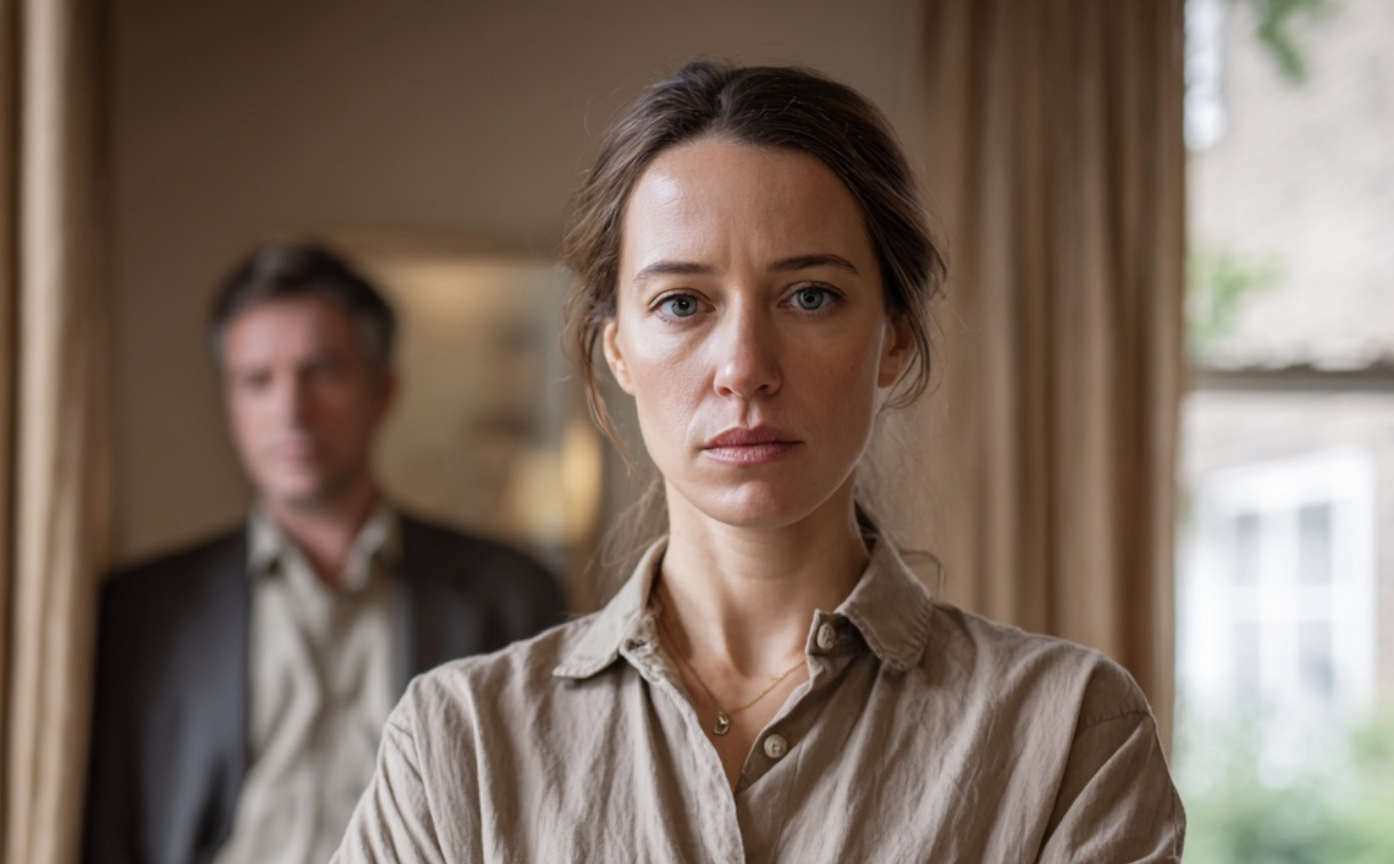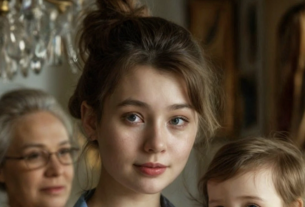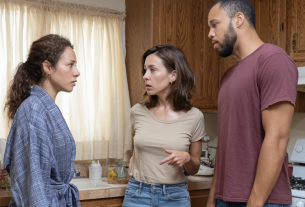Olga Sergeyevna straightened the tablecloth and looked over the table. A milestone. A round number—fifty-five. A vase of carnations, warm salad, “herring under a fur coat,” her signature eggplant rolls. Borscht was simmering on the stove; Timur would always grimace—said anything without meat “isn’t food,” though there was meat in it. Like a schoolgirl, she waited for the doorbell and that very “miracle” he’d been hinting at for two weeks: “There’ll be a gift you’ll remember for a long time.” If it was a ring—then at last she wouldn’t be a “live-in.” She didn’t need a greeting card; she needed status. After the loud divorce ten years ago, she had learned only too well that a “common-law wife” is nobody on any form. They won’t let you in for surgery, you’re last in line for inheritance, your word doesn’t decide anything. And she wasn’t twenty-five. She wanted not romance but peace, the law, her own place beside a man who would call her his wife, not “Olga Sergeyevna, the woman I live with.”
The bell rang. On the threshold stood Artyom with Nika, boxes and flowers in their hands.
“Mom, happy birthday,” Artyom hugged her quickly and tightly. Tall, thirty-two, a commissioning engineer at a medical equipment plant. Seven years on the job without whining or complaints, like his father in his best years. “Nika said it’s not a party without tartlets.”
“It’s not a party without tartlets,” Nika smiled, slipping off her shoes. A trim girl, twenty-six, an elementary school teacher, married two years. She ran in heels as deftly as children at recess. “Olga Sergeyevna, where are the bowls? I’ll plate these in a flash. And I’ll put the kettle on, okay?”
“Thank you… right-hand shelf.”
Nika had already tied on an apron, deftly chopped herbs, warmed the chicken, set out the bread, checked the candles. She wasn’t doing it for show—you could see it mattered to her to ease her mother-in-law’s burden.
“Artyom,” Olga said, “how’s work? Not overdoing it?”
“Our country’s in savings mode,” he waved it off. “We sleep on the machines. Don’t worry. Oh—hi, Timur.”
Timur came out of the room where he’d been sitting with his phone. Forty, lean, a trendy haircut, a ring in his ear, new sneakers. He always sat “off to the side”: the supposed “master of the house,” nothing to do in the kitchen, “head of the household” in the living room. In practice—he played on his phone and commented on other people’s movements.
“As always with your school-cafeteria fare,” he nodded at the salads. “Olga, don’t fuss. Serve it—we’ll clean up later. I’m hungry.”
“Timur, at least help carry out the plates,” Nika said gently.
“We have a division of labor here,” he smirked theatrically. “I, so to speak, greet the guests.”
Olga tried to smile, but her eyes snagged on the front door: in the doorway, without taking off her shoes, appeared Diana Abramovna. In a checked coat, bright lipstick, with her signature “little shopping bag” from the hardware store, like a set of medals. A former hairdresser, now a pensioner, proud of “always keeping busy.” She’d come to the live-in partner’s milestone like to an inspection—couldn’t let the “deal of the century” go through without her.
“And here I am,” she swept her gaze around, assessed the table, and sneered at the carnations. “Happy birthday, Olechka. I couldn’t not come. One has to support my boy on a day like this.”
“Thank you, come in.”
The table was noisy. Artyom joked, teasing his wife lightly—just enough to make her laugh, not take offense.
“Nika, go easy,” he nodded at the tartlets. “You’ll be working those off on the school line till July.”
“On what line?” Diana didn’t get it.
“At school. Extra calories, extra squats,” he winked. Nika snorted:
“Then stop sliding this ‘mayonnaise mountain’ under my hand.”
“You two are a pair,” Olga said, watching them fondly.
Timur kept a little to the side, like a director about to announce the climax. He tapped his fork against a glass.
“So then,” he stood, playing at solemnity, “it’s time for the gift.”
Olga didn’t blink. In her head—a short film: he pulls out a velvet box, jokingly takes off a simple ring from the keyring, drops to one knee… She didn’t even hear Artyom whisper quietly to Nika, “Hold Mom if anything.” He didn’t believe in Timur; it was obvious. But for his mother’s sake he hoped for a miracle. Although grown men rarely believe in miracles.
Drawing out the pause, Timur took a shapeless bundle from a bag. A dress. With a gray-olive sheen, dense “breathable” knit, cowl neck, a dropped shoulder, length to mid-calf, a cut meant “to conceal.” A fat “70% OFF” sticker dangled from the tag.
“We spent a long time choosing,” Diana Abramovna nodded. “Look at the color—practical. If you splash something, you won’t see it. And the fabric—viscose, not some synthetics,” she brazenly ran her palm over the knit, then peeked at the price: “And most importantly—what a bargain. With the ‘gold card’ it was just two thousand nine hundred ninety. I wrangled that, mind you. The store is Lady-Comfort. Just right for your age.”
Nika froze. Artyom lifted his glass and, for a second, hid his face behind it. Olga went pale. Her ring vanished like a mirage. Before her she saw the slack fabric, the chopped-off waistline, and the word “age.” It was as if a stranger’s hand pushed her toward a reply:
“Thank you. How… useful.”
“You could’ve sounded a bit more cheerful,” Diana shot back at once. “Men don’t give gifts like this every day. Tell her, Timur.”
“Olga, don’t ruin the mood,” Timur sneered. “I made an effort.”
Artyom looked up at his mother.
“Mom, let’s do dessert,” he said quickly, as if cutting the scene short.
When the guests had left, Olga carefully hung the dress in the closet—with a stranger’s habit of tidiness. Timur couldn’t hold it in.
“You’re ungrateful. You could’ve at least tried it on. Normal women hang themselves around your neck for things like that.”
“I was hoping for a proposal,” she answered calmly. “You yourself said: ‘You’ll remember it for a long time.’”
“What do stamps matter?” he said. “We’re living together, aren’t we? I’m fine with it. And you should be. A stamp is a line at the registry office and a split-up when you divorce. You want to divide the plates later? I don’t. Besides, my ex still drives me up the wall. I’m not getting involved with other people’s courts.”
“Convenient,” Olga said. “Everything to your advantage.”
“Don’t start.”
She wasn’t starting. She was taking note.
A month later, “optimizations” began at Artyom’s plant. The department was cut by half, he was moved to part-time. Pay delays, bonuses slashed, side jobs forbidden. Their rented two-room place was getting cramped not only physically but financially.
“Mom, we’ll manage,” he said, though his eyes betrayed the arithmetic. “Nika’s a champ, she’s picking up hours with an after-school club, but it’s pennies.”
Olga opened the app and transferred him a substantial sum. She did it at night—deposited cash into her card and asked her son to keep quiet: Timur took her expense reports under the pretext of “planning the budget together,” and every transfer toward her son turned into a lecture.
Timur sensed something anyway.
“I said: you don’t help a grown man,” he declared in the morning. “Let him hustle. What are we, his sponsors? We have our own goals. I want to get a car in the next few months, remember? For ‘Mom’ it needs to be bigger so it’s comfortable for her to ride. The money’s a common pot. Don’t be raiding it.”
“It’s my money, Timur,” she said stubbornly. “And my son. I’ll handle it.”
“You live with me—so we decide together,” he pursed his lips into a slash.
Olga nodded, and that evening withdrew cash again. The transfers continued “by a hidden path.”
When Artyom said, “Nika’s pregnant,” Olga sat down and closed her eyes for a second. She didn’t have the right speech—just simple happiness.
“Dear God,” she said softly. “Thank you. I’ll help with whatever I can.”
“Congrats,” Timur tossed coldly. “Only let’s agree right away: other people’s families aren’t our burden. I’m not funding their strollers and diapers. We need to think about ourselves. And I don’t need noise in the house.”
“That’s my grandchild,” Olga replied. “And this is my home.”
“Home—for now it’s the apartment I live in,” he reminded her pointedly. “Don’t get carried away.”
A few days later Timur came back pleased with himself, like after a successful fishing trip:
“News! Mom sold her apartment. In the nick of time. Cash in hand. We need to get a car. I’ve been eyeing a crossover for a while, nice and high. Perfect for trips to the dacha and the hospital.”
“She sold her apartment?” Olga tensed. “Why?”
“Because. Deposits aren’t for us. Steel on wheels—that’s something. And by the way, where are the keys to your grandma’s house? I didn’t find them in the dresser. Mom and I thought she should move there. Fresh air, a vegetable patch. And we’ll be nearby, driving back and forth—makes perfect sense.”
Olga’s mouth went dry for a second. Grandma’s house forty minutes away by commuter train—apple trees, a linden, the porch where she’d sit with a book as a teenager. The house Grandma had left to her, not Timur. The house she had already mentally given to Artyom: space, fresh air; the child’s mother would have an easier pregnancy.
“Artyom has the keys,” she said evenly. “The house is meant for them. They’ll have a baby soon; they need more space. Grandma and I talked about it while she was still alive.”
“Why didn’t you ask me?” Timur flared. “What am I here—a piece of furniture? We decide everything together. Do you even remember who the man in this house is? Mom and I already had plans.”
“Timur, you’re not my husband,” she said. “Plan your own purchases, please. My house—my decision. And yes, since your family insisted on selling the apartment—now decide where to live. But you’re not moving into Grandma’s house. That’s not up for discussion.”
Jeanne’s voice surfaced in her head. Her friend had said it in the very first year, when Timur moved in with Olga with four shopping bags and two boxes:
“Watch out, Olya. He’s convenient. But convenient doesn’t mean reliable. He’ll adjust to you exactly until he realizes he can live at your expense. Don’t sign anything over to him. He’s an opportunist.”
Olga had joked it away then. She was scared of being alone again, and Timur seemed like a cure for the emptiness. The cure turned out to be a cheap substitute.
“Then Mom will stay with us,” Timur snapped. “There’s a room. She has nowhere to go. We’re not animals.”
“No,” Olga said. “Not in my apartment.”
“What are you, a monster?” he shouted. “You want to throw an old woman out? You’re shaming me. The neighbors will point fingers.”
She turned and went to the bedroom. No arguments. She pulled Timur’s suitcase from under the bed—the very one he’d been “gradually” moving in with three years ago. She folded shirts, sneakers, his chargers, visor caps, the collection of cheap colognes, old receipts. She didn’t even try to lift the box with dumbbells—he could come back for it. A kitten stared up at her from the store’s logo on one of the bags. In the kitchen, Timur was calling his mother, making the phone’s flashlight alert strobe as if that would help, trying to pressure with words:
“You’re not listening! Use your head. Mom’s got a cold. She needs care. Just wait a bit. We’ll figure something out later.”
He hoped she’d soften. She always did.
Hours passed. At last two duffels, one suitcase, and four shopping bags lay in a row in the hallway. Over the threshold stepped Diana Artyomovna and, surprised at the sight of the things, dragged her own suitcase in.
Olga called Artyom and switched on speakerphone deliberately—so the words would be heard by both.
“Son, listen to me. The house is yours. Take it. Settle in. I’ll help with whatever I can,” she said.
“Mom,” Artyom’s voice brightened at once, though he always kept himself in check. “Thank you. You have no idea how much this saves us.”
“I do,” she said.
“Olga Sergeyevna,” Nika couldn’t help chiming in, “I’m crying from happiness. Thank you. We’ll be careful with everything… We’ve already started cleaning the kitchen, I’ll wash the windows, Artyom will put up the shelves. We won’t let you down.”
“Live there,” Olga said. “It’s Grandma’s house. It’s for you.”
Diana stood at the door with three bags, waiting for the fourth to be carried out.
“What is this circus?” she demanded. “So I sell my apartment and you put me under a fence? I treated you like a daughter, Olga… I loved you. And you…”
“Diana Abramovna,” Olga said calmly, opening the front door, “you’re confusing our relationship with a consumer basket.”
Timur lunged for the suitcase:
“Where are we supposed to go?”
He realized this wasn’t theater when Olga carried the last bag out onto the landing and set his sneakers beside it.
“You insisted on selling the apartment. You’re a grown man. You take responsibility. Where you live is your problem, not mine,” she said. “You are not my husband.”
At that moment Zina popped onto the landing—the neighbor from the fifth floor, in a gaudy housecoat and with a squint that politely herded any household scammer back into line. You didn’t have to call her. She lived opposite and had heard everything that happened in the stairwell for the last ten years.
“I’ll sit here for a bit,” Zina announced, settling onto a stool she’d somehow conjured up at once. “Eyes peeled. Just in case the television decides to walk out by itself.”
Diana clutched her heart:
“Oh, I feel faint. That’s it, my blood pressure. My heart is stabbing me. I’m going to fall.”
“Hold on,” Olga took ammonia from the medicine cabinet in the hall and moistened some cotton. She held it to Diana’s nose. Diana jerked, inhaled, and opened her eyes, suddenly much livelier.
“Alive, I see,” Olga said. “I’m not calling an ambulance. No acute symptoms.”
“Witch,” Diana hissed. “May you—”
“Don’t,” Zina cut her off. “You don’t spit on someone else’s doormat. There are your bags.”
Timur tried a couple more times to “turn” Olga—first with promises, then with scolding:
“I’ll make it up to you, hear me? I’ll buy the ring, if that’s what you want. Just don’t disgrace me. Let’s think this over. I’ve only got one mother. You’re cruel. Who’s going to bring you a glass of water in your old age?”
“Take that question to the people who sell old folks’ apartments for crossovers,” she answered. There was no hysteria in her voice—only clarity.
The door closed. Suitcase wheels scraped down the corridor. Diana muttered something about “the ungrateful,” Timur whispered, “You’ll regret this,” and fell silent. Olga felt a chill; her fingers trembled, but she didn’t reach for valerian. Zina brought a glass of water.
“Good for you,” the neighbor said. “Long overdue. I’ve been watching your ‘boy.’ He only loves what rustles and glitters.”
“Thank you, Zina.”
“Don’t thank me—thank yourself. You stood your ground.”
When the apartment fell silent, Olga sat down on a chair. She wasn’t afraid of the quiet—she was afraid of the emptiness where, instead of words, there was penny-pinching on other people’s napkins and plans for your property. She caught herself thinking: “There won’t be any more men.” Not because she was “no longer desirable,” but because she no longer owed anyone proof that she was “as good as a wife.” She was tired of playing at families that never came to be. She was guarding her peace.
The phone rang. Artyom.
“Mom, I’m here. We’ve almost cleaned everything. Nika found the mugs with the yellow daisies—she says they’ll be our ‘special occasion’ ones. I reinforced a kitchen shelf, tightened the faucet—it was dripping a bit. It’s so good here. The air’s easy to breathe. Thank you.”
In his words there was more than gratitude—there was assurance.
“Live there, son,” Olga said. “Let the grandchild grow up in that house. I’ll come tomorrow with curtains and bedding. I’ll see what to tidy up.”
Nika took the phone:
“Olga Sergeyevna, you’ve saved our life. It’s like a weight off my shoulders…” she broke off. “I’m sorry. I didn’t mean to be dramatic. I’m just happy. We saw the apple trees here. I’ll learn to bake your pie—the one with jam. And we’ll invite you for tea. Thank you.”
“Nika,” Olga said, “what I’ll teach you is not pies but how to make time to rest. The rest will follow.”
She hung up and looked at the dress hanging in the closet. Let it hang. A reminder. Ahead were a new cradle, tiny onesies, and apple blossom. That was enough to believe not in someone else’s “miracles,” but in her own happiness.



